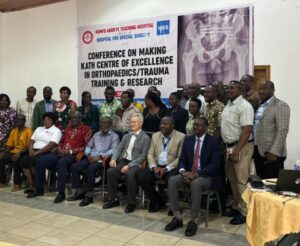“Traumatic injury alone causes more death and disability than HIV, malaria, and TB combined and is considered by the WHO to be a neglected global epidemic” Global Surgery Foundation.
For the past four years I have been traveling to Ghana and working to understand the breadth of orthopaedic care given in a public tertiary care center, how care is provided, the needs of the treating professionals, and most of all, the function of the system as a whole.
A year ago, that work culminated in the development of an orthopaedic trauma fellowship program at Komfo Anokye Teaching Hospital (KATH) in Kumasi.
This is the first in what I hope will be a series of training programs designed to create the leading musculoskeletal training program in West Africa. For the past 15 months, nine (9) other surgeons from Europe and North America have assisted me in this effort.
They have traveled in successive 2–4-week blocks to train two young and extremely talented specialists at KATH (Ronald Awoonor-Williams and David Anyitey Kokor). These surgeons will be subsequently training others in a program accredited by the Ghana College of Physicians & Surgeons.
By the end of this Summer, I can say with certainty that Ghana will have two highly trained and extremely talented experts in complex orthopaedic trauma care providing exceptional care at KATH. Nevertheless, their efforts may be hampered by the profound lack of resources within the Ghanaian system.
Ghana is at an enormous crossroads. 21st century industry and transportation methods have infiltrated all levels of society within the country. Public safety, however, remains stuck, with pre-industrial standards. Road traffic accidents, mining catastrophes, construction failures create an incredible volume of patients requiring care.
From an orthopaedic perspective, most of this care is algorithmic in Europe and North America; outcomes are predictable, and care is routinely rendered quickly and efficiently not out of convenience, but because we know that our ability as surgeons to alter the outcome is dependent on only a few factors.
The first is our knowledge, technical skill, and judgement. The second is the resources available to us in terms of surgical teammates, instruments and implants. And the third is the timing of care. Without the appropriate resources, and the ability to operate at the right time, no amount of our surgical knowledge, skill or judgment can alter the outcome.

Despite seeing a volume of patients equal to or greater than that of any trauma center in the Europe or North America, KATH is so underfunded and under-resourced that most orthopaedic trauma care is currently disastrous. Patients leave the emergency department against medical advice to die because they cannot afford trauma care for open fractures.
Patients lucky enough to survive return months or years later with severe deformity or infection, and often with permanent severe disability that cannot be changed. Many, if not most, of these patients are young men and women in the prime of their lives who will not be able to provide for their families let alone themselves, despite the fact that they had treatable injuries.
Patients that do receive care have it provided in conditions and with resources no competent expert would consider sufficient to render adequate care. The surgeons do their best, and there is great talent, but they are not magicians. They work with instruments and resources grossly inadequate to the task at hand. They work in a system that couldn’t possibly achieve excellent outcomes.
We, at Hospital for Special Surgery (HSS), are working extremely hard to help change all of this. First, we are training two orthopaedic trauma surgeons who will be able to offer subsequent expert training to appropriately selected candidates from throughout Ghana and West Africa. We are simultaneously training nursing and OR teams because we understand no surgeon is great without a great team in place.
These efforts have been carried out through the Hospital for Special Surgery (HSS) in New York, by its Global Musculoskeletal Health Equity Division (GMHED). HSS is a specialty hospital for orthopaedic surgery recognized as the world leader in orthopaedic care. The GMHED division began in 2021, and the first surgical task was assessing and developing a plan for KATH in Ghana.
Through our Anesthesia Director, Dr. Mark Brouillette, GMHED had a long relationship with KATH. The task I was asked to complete was to assess needs at KATH and to develop a 3–5-year plan to build sustainable change. Out of interviews, focus groups, observations of clinic and operative care, and constant dialogue with a group of extremely dedicated surgeons and administrators, the needs and desires became obvious.
From the government, to the College of Physicians and Surgeons, to the administration and surgical staff at the hospital, everyone desired greater expertise in all orthopaedic specialties. Observations on the ground made it clear that KATH, as a hospital serving 13 regions in Ghana, and a referral center for up to 22 million people, was perfectly situated to become a major training center for orthopaedic surgery.
The complexity of the patient’s needs, from acute injuries, to chronic conditions in all age groups made it clear that with adequate resources and training, surgeons at KATH could become the best in the world at providing care.
GMHED is positioned to offer the same training in joint replacements and spine surgery partnering with Foundation for Orthpaedics and Complex Spine (FOCOS) in Accra. We are facilitating partnerships with organizations to train other Ghanaian surgeons in sports medicine (University of Calgary), pediatric orthopaedics (with Dr. Mark Barry and COEDN.org) and musculoskeletal oncology (Harvard Medical School).
All of these experiences will be full, one-year immersive subspecialty programs, designed to create expertise needed to run similar programs at KATH. The goal is to help them disseminate this expertise through Ghana and all of West Africa. We will have succeeded when the only foreign orthopaedic surgeons coming to KATH or any other public hospital in Ghana are coming to be educated, NOT to provide assistance.
Ghana clearly has a thriving business community, and also a population that is industrious, increasingly well-educated, and poised to thrive. This is unfortunately hampered by the regular sacrifice of young, energetic, and hardworking people to traumatic injuries that cannot be cared for, due to the limited investments in equipment, lack of adequate supply chains, and effective systems in place to care for the injured, crippled, or sick.
For the injured, orthopaedic implants must be available at either zero or minimal cost to patients. Trauma care MUST be readily available to be given—whenever necessary, and not when “affordable”. Infrastructure—resources and people—must be in place to keep this system functioning.
HSS is situated to provide the know-how to accomplish this. For the crippled—either the young with developmental conditions, or the old with severe arthritis—implants must also be affordable enough for them to have a meaningful quality of life. Over the past three years we have worked with the former Presidential Advisor on Health, Dr. Anthony Nsiah-Asare, and are now working with the newly-appointed Minister of Health, the Honorable Kwabena Mintah Akandoh.
We have coordinated donations of large amounts of implants, tables, and a fluoroscopy machine. Incredible efforts by local physicians and administrators at KATH are being made. Still, we are in desperate need of a commitment from benefactors in Ghana to upgrade sterilization systems and operating theatre conditions to safely guide Ghanaian public hospitals into 21st century methods necessary for adequate care.
The finances to improve public hospitals clearly exists in Ghana – the only question is whether the business community and the government can partner to ensure the young and talented people of Ghana are able to thrive.
BYLINE
Andrew Grose, MD, MSc,
Surgical Director, Hospital for Special Surgery – Global Musculoskeletal Health Equity Division.
https://www.hss.edu/global-musculoskeletal-health.asp










